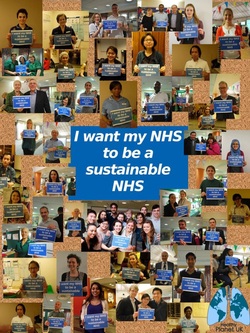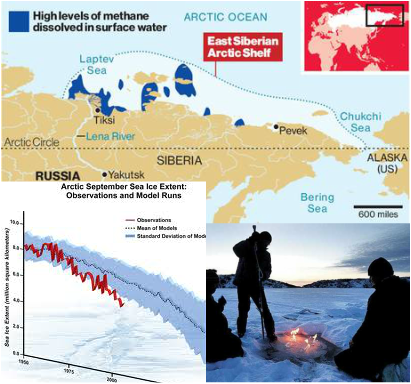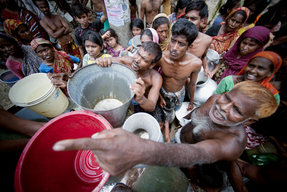 Izzy Braithwaite From a BMJ Blogs series for the upcoming CleanMed Europe Conference - edited version at: http://bit.ly/13EBL8D The concept of sustainable healthcare and – related to that - how environmental change affects health are not generally taught in medical schools, but I was lucky enough to take part in a student-led national programme on the topic in my first year. I had long been interested in global health and the environment, so was keen to find out more and get involved in this area. The focus of my work has been with the Sustainable Healthcare Education (SHE) Network, for example contributing to a set of downloadable teaching resources and subsequently helping to collate a set of case studies on existing student-selected components. I’ve also been involved in the most recent project on curriculum learning outcomes, organised in response to a request from the GMC, which has been a multi-stage consultation process. The three overarching learning outcomes proposed on the basis of the consultation are to be published online soon and cover: the relationship between the environment and health; the environmental sustainability of health systems; and the ethical and policy-related issues that arise from understanding these two topics, such as how the duty of a doctor to protect health applies to future generations. As I‘ve read more about our impacts on the environment, climate science and the extent to which human health depends on ecosystems and climate stability, I’ve been surprised and concerned by how little of this information seems to reach the general public, including medical students. To help change that, I’ve been running workshops and campaigns with a student group called Healthy Planet UK, in partnership with a larger network called Medsin. Medical educators, students and clinicians wishing to set up more teaching in their medical school often encounter objections that there's not enough space in the curriculum or that these topics aren't relevant. Yet the evidence shows that climate change is an increasingly important threat to global public health, and I think the scope for health professionals to help shift political narratives around environmental issues is often underestimated. If my cohort of future doctors needs to know about tobacco or antibiotic resistance, then surely we also need to understand how changes to weather patterns and ecosystems are affecting, and predicted to affect, health. Equally importantly, we need to be aware of the growing evidence base around the opportunities, termed 'co-benefits', to deal with burgeoning public health problems such as obesity and poor mental health in a way that's synergistic with the goals of sustainable development. Given some of the details I had to learn in pre-clinical medicine, the argument that there's not enough space in the curriculum suggests it’s an issue of priorities. Do we really think enabling tomorrow's doctors to tackle what may well be a bigger health threat than tobacco - especially considering the complete inadequacy of the political response so far - matters less than learning, for example, all the steps of the Krebs cycle? My learning in this area has influenced the way I think about the rest of my education, and I think I'll be a better doctor for it; better able to understand the macro-scale influences on patients' lives, and to contribute to discussions about how health services could be better for both patients and the environment. To create lasting change - whether in sustainable healthcare, climate policy or other public health issues – tomorrow’s doctors require an understanding of the issues, to have had the freedom to discuss them and try out their ideas, and the skills for effective collaboration, including inter-sectorally. Through the SHE network, we are seeking to create this space for students to learn, reflect and debate about the issues, and to develop the skills to help lead the transition to sustainable healthcare. The fourth CleanMed Europe conference takes place at the Oxford Examination Schools from 17th-19th September, and Izzy will be talking about the SHE Network and Healthy Planet's activities during the conference.
0 Comments
18/6/2013 Methane 'plumes' in the Arctic, positive feedbacks - and why we all need to act on climate changeRead Now Jake Campton, UWE ""Dense plumes of methane over a thousand meters wide" have been discovered leaking from the permafrost around northern Russia following continued warming in the region - and the rate of release has been accelerating. Why does this matter? Methane is a potent greenhouse gas with 20 times the warming potential (heat-retaining ability in the atmosphere) of carbon dioxide. That makes it extremely problematic. The total amount of methane beneath the Arctic is calculated to be greater than the overall quantity of carbon locked up in global coal reserves, meaning a planetary time bomb is currently ticking in northern latitudes. It is not only the scale of these outflows that is unprecedented; it is also the alarming frequency at which they are occurring. Dr. Semiletov’s research team that made the discovery found hundreds of these plumes, similar in scale, over “a relatively small area”. Our planet’s weather has been thrown into disarray in recent years; the last decade has witnessed more weather records broken than the entire last century! The more we continue to heat the Earth, the quicker the permafrost will melt, increasing the rate methane can escape its icy prison; a positive feedback effect (Arctic ice is not the only one either, there are a lot in action - see this page for info on a few others). We will eventually become locked in by this effect, with heating leading to more rapid heating, accelerating the whole process further still. Add in the reduced albedo effect from the rapidly receding glaciers of Greenland and surrounding area and the danger we are in becomes clear. We are in trouble. It doesn't take too much time reading up on climate science - as described in a World Bank report just out - to work that out. What's more, it's not just an issue for the polar bears; it's a health issue too. Humans are reliant on the environment and most critically, a stable climate to provide food; it doesn't magically appear on our supermarket shelves (even if that's what many kids now seem to think!) The last few years have seen intense droughts ravage vast swathes of the planet, including the major grain producing nations: Russia, Australia and the U.S. among others. By mid-2012, the U.S only held enough grain for just 21 days. The increased scarcity of its staple crops caused sharp price spikes too - corn reached $8.39 a bushel by August 2012, an all-time record. Farmers were forced to cull large numbers of livestock as they suddenly became too expensive to feed. Are these the sorts of trends we should expect to continue looking forward? Grains becoming so expensive that meat is affordable only for the richest? And what about the poorest nations? What will the implications for malnutrition and food security be if the main exporting nations are unable to meet export demands? In 8 out of 13 recent annual harvests, global consumption has exceeded production, eating away at our grain buffers. A few more volatile growing seasons, and we could all be in real trouble. No nation is safe from a perturbed Gaia… I blame a lot of people for this current mess. Not enough people care. That fatalistic idea, 'I'm one person, nothing I does matters' is, frankly, crap. 65 million UK inhabitants doing their bit, and I don't mean just recycling here, would make a substantial difference. If we were also to factor in 700 million Europeans and 300 million+ Americans - not to mention a billion plus Chinese and others - you can see the potential for drastic, meaningful, global change. You see, you are not just one person; you are every environmentalist that plays their part in this conundrum. You are hundreds of millions of people. That is where our power to change lies; in sheer numbers. Industry is changing, albeit reluctantly, now society must change, too. My biggest fear is that most people won't act. It's a failure of our education system, a neglect of our moral responsibility - and it could be a catastrophe for humanity. I realise we have had many decades of industrial pollution before us, but they weren't aware of the implications of their actions - and they were also far fewer in number, each consuming much less. If current trends continue, things could become truly and irreversibly messed up within a couple of decades and that terrifies me. It will be this generation and our immediate predecessors, the ones that peered into the precipice, who will be blamed. We could still make a meaningful impact on the current situation but I worry that we won't. We could have a great future ahead of us, but many forget that humanity and the environment are inherently intertwined. Until we recognise Earth as the delicate, dynamic and precious entity that she is, and treat her with the respect she requires, we will continue unabated along this perilous path. The bridge is out up ahead, we need to change paths. I sometimes worry that the window for action has already closed, it’s something I feel bitter about, something that angers me greatly. There are people out there who are particularly responsible, who keep ignoring the problem, and their negligence is literally costing the Earth. I believe that if more people shared my sense of impending danger more would get done. I’m not sorry if this offends you, it's probably because you are the sort of person I am referring to. If my words are intrusive in to your way of life, maybe your way of life is part of the problem. When something so big is at stake, I think you have to ruffle a few feathers - feel free to comment if you wish to discuss anything further, I’ll gladly respond. I know its complex, and it can feel like whatever you do is a drop in the ocean -sometimes it's difficult not to feel frustrated and concerned - but there is lots you can do. Start off by educating yourself; there's a lot of information out there - but always be critical. Outspoken anti-climate behemoths like the Koch brothers, use political and monetary leverage to fund anti-climate change ‘research’ and spokespeople to help maintain the status quo for their incredibly irresponsible and selfish gains. Be wary…  Are you a carbon addict? Take the test... Are you a carbon addict? Take the test... Below are some ways I try to reduce my impact on the environment. They're small steps that don't require much effort - why not give some of them a go? Eating less meat - I can't understand why people assume it's a right and a necessity to eat meat every day, but this is one of the most effective ways you can reduce your burden, as well as making yourself healthier in the long run. We have molars for a reason; we are omnivores, not carnivores. Cycling and walking wherever you can is another great step - driving a few miles down the road is a missed opportunity to stay fit, a pointless waste of petrol and needless emission of carbon. I realise some people can't - fair enough, but most could. I bike everywhere, I feel great because of it and I’m very fit as a by-product. You could shower instead of filling a bath, turn off plug sockets at the wall to avoid appliances ‘ghosting’ electricity, wash your hands with cold water instead of hot to save energy, boil the exact water you need when making tea, by cloth bags for shopping trips and avoid plastic, use LED light bulbs; expensive but they can last over 30 years and use just 10% of the electricity of halogen/filament bulbs! Wear an extra jumper instead of cranking up the heating in colder times, turn down the brightness on your laptop to reduce energy consumption and there are many more. These may sound like small things, but, when added up and multiplied by the efforts of millions of others, cumulatively, we can drastically reduce our strain on Earth and preserve the environment for future generations, as is our responsibility. Things you do in your daily life matter, and - imperceptibly - help start to shift the norm. However, we need political change too, and contacting your MP and MEP, signing petitions or even getting involved or setting up local campaigns isn't actually as hard as it can seem - Google is your friend here. Anyway, rant over - you're all free to act as you see fit of course, but what I'd really like to say, and excuse my French, is that you personally don't screw it up for future generations because you can't be bothered to act responsibly. Acting together, we have a chance to change our future for the better. There’s no I in team, but there is in humanity. Share yours.  The military supply water in Dhaka (Source: UN/Kibae Park) The military supply water in Dhaka (Source: UN/Kibae Park) Izzy Braithwaite Originally published at: http://www.rtcc.org/2013/05/27/comment-health-overlooked-in-our-response-to-climate-change/ The protection of human health and wellbeing is a central rationale for the emissions reductions called for in the very first article of the UN Framework Convention on Climate Change (UNFCCC). Yet, somehow, the issue is missing from many parts of the UN talks. The growing body of research and evidence in the area over the past couple of decades hasn’t really translated into a broader understanding of how climate change and health are related, beyond a relatively small community of academics and health professionals. Knowledge about the links between climate and health among the public, climate negotiators and environmentalists is often limited and quite superficial. It typically doesn’t stretch far beyond the more direct impacts, such as heatwaves, vector-borne diseases or extreme weather events such as flooding. Indirect effects on health are rarely considered, and both the media and the public tend to frame the impacts of climate change in terms of the risks to ecosystems and species or economic losses; very rarely in terms of its other impacts on people and their health. Perhaps this is part of why climate mitigation and adaptation measures fail to get the levels of both political and financial support they need to tackle climate change and to protect and promote health in the face of it: current levels of adaptation finance, much like current emissions reductions pledges, are grossly inadequate. As a glance at any newspaper or polls about the relative political importance of different topics make clear – most of us are concerned about our own health and the health of those we care about, including that of our children and grandchildren and less visible problems like climate change, which are also delayed in time, often feature far below this on the agenda. Climate change will dramatically affect the health of today’s children and young people, and more than that, policies to promote the health ‘co-benefits’ of sustainability and climate action could greatly improve health. Surely those messages, if communicated more effectively, could be a strong driver to help us achieve the sort of rapid, meaningful changes we need in order to avoid catastrophic climate change - couldn’t they? In the UK, several thousand health professionals have joined the Climate and Health Council to add their voice to a global climate and health movement which already has strong voices in Australia, Europe and the US, along with several other regions, and they are starting to connect up, for example with the Doha Declaration. Doubt is their product... At the same time, communication with negotiators, the mainstream media and the wider public around what’s known about climate and health clearly hasn’t yet been very effective, and has been compounded by the confusion that biased and inaccurate media such as Fox News and the Murdoch empire seek to create. This is very much like the 'merchants of doubt' phenomenon that emerged among tobacco companies as the evidence of tobacco's health risks came to light. One of my friends recently asked me when he saw this video, “if climate change is really such a big health threat, then why don’t most people know that, and why isn’t it mentioned more in the news?” I’m convinced by the evidence that it is – some of it is collected in our resources section– but I found it hard to answer his question. Have we all, consciously or subconsciously, decided that it’s too depressing so we don’t want to know, do the media decide it’s not worth broadcasting, is it related to the success of fossil fuel companies and their PR and lobbying teams, or is it something else? I don’t have the answers, but I think there are many reasons: for one, picking out long-term trends to ascertain what health impacts are attributable to climate change is no easy task, and – especially when it comes to modelling future health impacts which are often highly dependent on socioeconomic factors too – the science is far from simple. Predictions, of necessity, depend on various assumptions and on multiple interacting factors. As with climate change in general, the real-world effects are highly uncertain: not because scientists think health might be fine in a world four or six degrees hotter, but because it’s very hard to work out exactly how bad the impacts may be. Even the World Bank now explicitly recognises that this is what we’re currently on course towards, that it’ll be far from easy to adapt to, and that such a temperature rise would conflict greatly with its mission to alleviate poverty. The dangers of ignoring Black Swans As George Monbiot pointed out in characteristically optimistic style last year, mainstream global predictions for future food availability in the face of climate change may be wildly off – because they’re based only on average temperatures rather than the extremes. A fatal error if this is true that the extremes – droughts, wildfires and so on – could become the main determinant of global food production, interacting with other changes to affect in ways that, like Taleb's 'Black Swan' events, are almost impossible to predict. If this does turn out to be the case, it’s likely that by far the biggest health impact of climate change will be malnutrition, as argued by Kris Ebi, lead author of the human health section of the last IPCC report. Inadequate food intake not only increases vulnerability to infectious diseases such as malaria, TB, pneumonia and diarrhoeal disease, but also kills directly through starvation. Food insecurity, in turn, can force people to migrate just as something more obvious like sea-level rise can, and this can be a driver of civil conflict. Both migration and conflict of course have major physical and health impacts, but their extent and distribution depend on numerous other things; climate is one driver among many. Like any give extreme weather event, it’s hard to attribute indirect effects of climate change such as these to climate change, given how strongly it interacts with other contextual factors. But that doesn’t mean it’s not a causal relationship. As the Millennium Ecosystem Assessment showed in 2005, our health and wellbeing ultimately depends on ecosystem functioning and stability, at levels from local to global. How ecosystems and in turn health are being – and will be – affected by climate change is unavoidably complex. That makes it hard to communicate and hard to use to change policy, but we cannot allow this to stop effective advocacy and action. The fossil fuel industries and the many dubious institutions and individuals they fund will not wait: with billions made from the sale of coal, oil and gas, they are much better organised and resourced than us at present, and they will use every opportunity to maintain doubt, prolong inaction and ensure that our future isn’t allowed to compromise their sales. In order to extend a sense of the importance of climate action beyond the environmental community and to secure broad and deep consensus on the need for concerted action, health must play a much bigger role in decision-making at all levels. Both impacts and health co-benefits need to feature more centrally in national mitigation and adaptation plans, and in our discussions around climate change more generally. That shift won’t happen on its’ own, and with the Bonn UNFCCC intersessionals coming up in June, it strike me that health should be a priority. Better resourcing and a comprehensive work programme including capacity-building, education and raising public awareness on subjects specific to climate and health would be a tangible and positive way to protect and promote health and to reduce the impacts of climate change on the most vulnerable. Shuo Zhang The conference of youth has already begun in Durban and the actual Conference of the Parties will be kicking off on Monday. I am both very excited and also a little bit concerned. I am excited because I feel that this year the Medsin delegation has put in so much work on framing our message and in understanding the negotiation process and the various audiences we want to target, that even though I won’t be going to join them, I know that they will all do their best to make the health message be heard.
What I am a little bit concerned by is how the media is going to cover the conference- would very little coverage be preferable to coverage of in fighting and walkouts? How much of the content of the negotiations, as opposed to the dramas will be covered? And something perhaps a little bit more philosophical- is it good that climate change has turned from being news-worthy to being something that is more in the features pages... Most of these worries are a bit excessive, and probably mainly to do with the fact that I won’t be in Durban to throw myself into the work, so instead I will be scouring the media keenly here to keep an eye on how things get translated. However I have been thinking, and realised that sometimes lack of media coverage can perhaps be a good thing. It is easy to get caught up with the negotiations, but what is really important is the long term work on personal, institutional and wider societal change that really matters. Durban is a good spring board to encourage action and enthusiasm and offers a time and place to take stock, however what is really important is for us to let people know about the wonderful work that the already being done. And as healthcare professional we have already been doing a lot, and we have the capacity to do a lot more; we just need to incorporate sustainability into our everyday practice and clinical thinking and make use of the partnerships that are available to us. And as medical students we are in the right place to make these changes, whether through asking climate change and health to be included as part of our curricular, doing projects and SSCs on the subject, and even just asking the consultants who teach us about their own clinical practice, and how they can make it better. So even if we don’t get the media exposure we wanted from the Durban conference, there’s still a lot of very important work to be getting on with! Below are just a few links to the work that the UK health community is already doing well: http://sustainablehealthcare.org.uk/green-nephrology-programme : Spearhead clinical programme that aims to look at how to make renal medicine and dialysis more sustainable http://www.nottenergy.com : A local government and NHS trust partnership that aims to address health inequalities, by working on fuel poverty. http://www.bluegym.org.uk : Community and university project that aims to look at how our coasts can be used for health benefits |
Details
Archives
February 2019
Tags
All
|
 RSS Feed
RSS Feed
